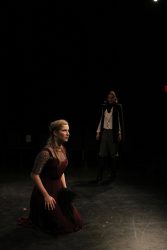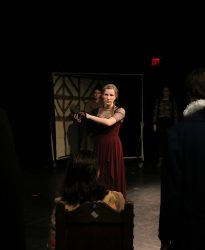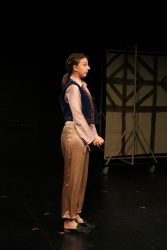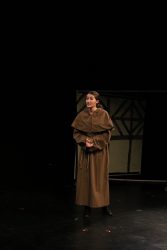Bwoggers Levi Cohen and Aliya Schneider went to the final dress rehearsal of KCST’s production of Shakespeare’s Measure for Measure, directed by Sylvia Korman, BC ’18, and produced by Tina Simpson, BC ’19. The play opens tonight at 8 pm in the Glicker-Milstein Theater and runs through the 11th; tickets are currently sold out, but if you go to the box office at 7 pm, you can get on the waitlist and likely get a seat. Tickets are free!
Measure for Measure isn’t the most heralded of Shakespeare’s works. One of the so-called “problem plays,” its tone veers from comedy to tragedy, from courtroom accusations to marriage proposals. This relative instability can lead to a scattered or incohesive production, where the whole is weakened by conflict between its parts. Luckily, KCST’s latest effort mostly avoids that fate.
Sylvia Korman, BC ’18, ably directed the all-female cast within the space, using the thrust setup to make the action seem less staged in one audience-facing direction and more natural. While every side of the audience will be able to see the stage equally well, the experience changes a little based on where you end up sitting: a scene between a duke and a petitioner plays very differently depending on if you sit behind the former or the latter. That’s a feature, not a flaw, of the thrust stage, and it makes the show that much more exciting.
The best performances of the night were given by AJ McDougall, CC ’21, and India Beer, BC ’20, playing Angelo and Isabella, respectively. Their onstage dynamic was wonderful to watch, and every scene they shared sparked with energy. Measure for Measure is, for me, most valuable in modern times as a text about a powerless woman standing up to a male authority figure and abuser—modern parallels aren’t hard to come by—and actually winning against him. Beer made Isabella’s anguish palpable, and McDougall the same for Angelo’s terrifying presence. The great performances served to underscore just how unfortunately relevant this play’s central conflict is.
Bailey Coleman, BC ’19, as Duke Vincentio, and Catherine Ferrante, BC ’21, as Lucio, also gave commendable performances; they were the best in the cast when it came to Shakespeare’s physical and verbal comedy.
That said, the electric central conflict was unfortunately let down by the comedic B-plots that surrounded it. Scenes between ancillary characters such as Pompey, Elbow, and Froth were usually well-acted, but often felt slow and much less urgent than any scene involving Angelo and Isabella. There was a sense that the comedy, rather than accompanying the central plot, was a distraction.
The delivery of the text was generally good, with the clarity that any interpretation of Shakespeare demands. There were only a few moments where it was not articulated well: for example, an early scene between Duke Vincentio and a Friar that establishes an important plot detail was difficult to comprehend. These were, however, few and far between.
The set design by Bella Carriker, CC ’19, is minimal, and does not do much to help distinguish various locations from one another. A pair of unwieldy, frame-like structures become doorways, jail cells, and walls without great specificity. The lighting, designed by Liz Schweitzer, BC ’18, is functional, and mostly ensured that every side of the audience got a fully-lit view of the events onstage.
Though portions of the comedy dragged, KCST’s Measure for Measure is, overall, worth your time. Korman’s use of an all-female cast is a novel way to experience this play that is so rooted in male-female power dynamics. That central Angelo-Isabella dynamic was compelling enough to keep my interest even during the less exciting portions, and I left the theater content that justice was, on the whole, served (spoilers!).
The show runs for about two hours, including one intermission.
Go see it if: you’re interested in a relevant work about abuser-victim power dynamics; you like free theater (!); you love a complex plot; you want to support a talented cast and crew of your peers!
Skip it if: a few off bits of comedy would bother you; you demand lavish design (it’s a black box show, folks); you’re totally averse to hearing about Elizabethan notions of virginity
- Lord Angelo (AJ McDougall)
- Duke Vincentio (Bailey Coleman) leaves Vienna in the hands of Angelo (AJ McDougall)
- Isabella (India Beer), our heroine
- Barnadine (Pearl Mutnick) argues with a disguised Vincentio (Bailey Coleman)
- Mariana (Grace Henning) makes an appearance in court to see an old acquaintance (AJ McDougall)
- Mariana (Grace Henning) removing her mask
- Pompey (Nell Bailey)
- Friar (Juliet Emerson-Colvin)
Photos via Aliya Schneider


 1 Comments
1 Comments








1 Comment
@Alena AJ McDougall is a god